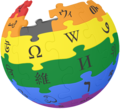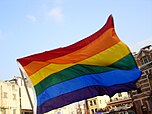
Back بوابة:مجتمع الميم Arabic Portal:LGBT Azerbaijani Партал:ЛГБТ Byelorussian Партал:ЛГБТ BE-X-OLD প্রবেশদ্বার:এলজিবিটি Bengali/Bangla Porched:Revelezh (LGBT) Breton دەروازە:کۆمەڵگەی پەلکەزێڕینە CKB Portal:Homo- und Bisexualität German Portal:LGBT DIQ Πύλη:ΛΟΑΤ Greek
| Main page | WikiProjects & Things you can do |

|
The LGBTQ+ Portal |

|

|

|
Introduction LGBT is an initialism that stands for "lesbian, gay, bisexual, and transgender". It may refer to anyone who is non-heterosexual, non-heteroromantic, or non-cisgender, instead of exclusively to people who are lesbian, gay, bisexual, or transgender. The variant LGBTQ adds a Q for those who identify as queer (which can be synonymous with LGBT) or are questioning their sexual or gender identity, while LGBTQ+ adds a plus sign for "those who are part of the community, but for whom LGBTQ does not accurately capture or reflect their identity". Many further variations of the acronym exist, such as LGBT+ (simplified to encompass the Q concept within the plus sign), LGBTQIA+ (adding intersex, asexual, aromantic and agender), and 2SLGBTQ+ (adding two-spirit for a term specific to Indigenous North Americans). The LGBT label is not universally agreed to by everyone that it is generally intended to include. The variations GLBT and GLBTQ rearrange the letters in the acronym. In use since the late 1980s, the initialism, as well as some of its common variants, functions as an umbrella term for marginalized sexualities and gender identities. The earlier initialism LGB began to replace the term gay (or gay and lesbian) in the late 1980s to reference the broader community. When not inclusive of transgender people, the shorter LGB is still used. (Full article...) Selected article -A transgender person (often shortened to trans person) is someone whose gender identity differs from that typically associated with the sex they were assigned at birth. Some transgender people who desire medical assistance to transition from one sex to another identify as transsexual. Transgender is also an umbrella term; in addition to including people whose gender identity is the opposite of their assigned sex (trans men and trans women), it may also include people who are non-binary or genderqueer. Other definitions of transgender also include people who belong to a third gender, or else conceptualize transgender people as a third gender. The term may also include cross-dressers or drag kings and drag queens in some contexts. The term transgender does not have a universally accepted definition, including among researchers. Being transgender is distinct from sexual orientation, and transgender people may identify as heterosexual (straight), homosexual (gay or lesbian), bisexual, asexual, or otherwise, or may decline to label their sexual orientation. The opposite of transgender is cisgender, which describes persons whose gender identity matches their assigned sex. Accurate statistics on the number of transgender people vary widely, in part due to different definitions of what constitutes being transgender. Some countries, such as Canada, collect census data on transgender people. Generally, fewer than 1% of the worldwide population are transgender, with figures ranging from <0.1% to 0.6%. (Full article...)Selected biography -Quentin Crisp (born Denis Charles Pratt; 25 December 1908 – 21 November 1999) was an English raconteur, whose work in the public eye included a memoir of his life and various media appearances. Before becoming well known, he was an artist's model, hence the title of his most famous work, The Naked Civil Servant. He afterwards became a gay icon due to his flamboyant personality, fashion sense and wit. His iconic status was occasionally controversial due to his remarks about subjects like the AIDS crisis, inviting censure from gay activists including human-rights campaigner Peter Tatchell. During his teen years, he worked briefly as a rent boy. He then spent thirty years as a professional model for life classes in art colleges. The interviews he gave about his unusual life attracted great curiosity, and he was soon sought after for his personal views on social manners and the cultivation of style. (Full article...)Selected quote -
—James Baldwin (1924–1987)
Current events
Selected image - Lesbian and gay students kissing in front of anti-homosexuality protesters at Oberlin College (Oberlin, Ohio, USA) in May 2000. Several hundred Oberlin College students turned out to rally against the protesters. The protesters—from Westboro Baptist Church of Topeka, Kansas—also protested the General Conference of the United Methodist Church while in Ohio.
Did you know… -
This month's birthdays
Selected lists
Related portalsFeatured contentThe following articles and lists have been identified as some of the best produced by the Wikipedia community:
TopicsCategoriesAssociated WikimediaThe following Wikimedia Foundation sister projects provide more on this subject:
Discover Wikipedia using portals |
© MMXXIII Rich X Search. We shall prevail. All rights reserved. Rich X Search
























